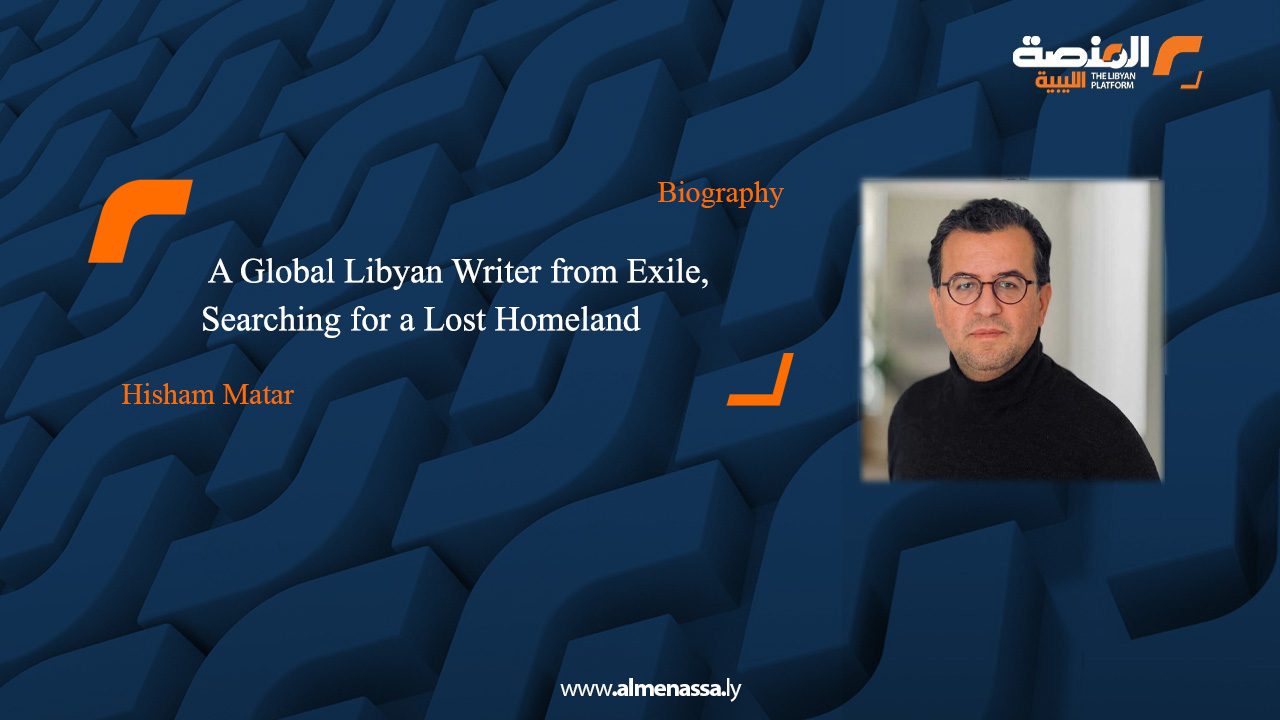In a world where memory intertwines with politics and the harsh experiences of exile, the name Hisham Matar emerges as one of the most exquisitely sensitive and profoundly honest literary voices. A Libyan writer who experienced loss and displacement early in life, his writings became a fragile bridge connecting a homeland he never truly saw, and a memory that ceaselessly summons those who are absent.


Hisham Matar was born in New York in 1970 to Libyan parents whose opposition to the Gaddafi regime compelled them to live in forced itinerancy. He returned with his family to Tripoli in his early childhood, living there for a few years before the pressures of security persecutions drove them to Cairo. This city would become a long and influential station in his memory. In the Egyptian capital, the young Libyan boy grew up surrounded by the ghost of his father, Jabr Matar, a steadfast dissident who would later vanish into the depths of Libyan prisons.
Far from his homeland, Hisham found himself a young man in Britain. He was not yet sixteen when he was sent to London for study under an assumed name, fearing that his country’s regime might pursue him even in his distant exile. He studied architecture and practiced it for some time, but remained haunted by a vague longing for writing. It seemed to him that buildings, however precise, were insufficient to contain the cracks in his soul.

In 2006, Hisham Matar surprised the literary world with his first novel, In the Country of Men, which immediately entered the Man Booker Prize shortlist and was translated into over thirty languages. In this work, Matar revisits 1970s Libya through the eyes of a child, witnessing dramatic political transformations in a neighbourhood teeming with secrets and fear. Hisham narrates a childhood suspended between a dream-like homeland and an authority that turned loved ones into enemies. In the background of every page, the question of paternal loss looms, a theme that would accompany him in all his subsequent books.
Yet, his most distinctive and unique work was a singular blend of autobiography and a fervent quest for justice: The Return, published in 2016. After the fall of the Gaddafi regime, Hisham Matar journeyed back to Tripoli in an arduous search for any trace of his father, who had disappeared into Libyan prisons two decades prior. Matar traversed various cities, visited detention centres, and revisited faces, simultaneously recalling scenes from his childhood and the thoughts and dreams of his imprisoned father. This book earned the prestigious Pulitzer Prize for Autobiography, becoming a poignant literary testament to what oppressive regimes inflict upon individual memory and its undying questions.


Hisham Matar writes in English, but his texts pulsate with an Arab soul steeped in profound longing. His writing style is delicate, almost poetic, sidestepping direct anger to instill a deeper anxiety in his reader: How does one survive the shadows of the past? How does one build an alternative homeland when the original is distant or utterly lost?
Between his novel Anatomy of a Disappearance and the book A Month in Siena, and his latest work My Friends, published in 2024, Matar has continued to excavate the same existential ruptures: the father, exile, and successive losses. In My Friends, the author returns to 1980s London to narrate the story of three young Libyans living with the repercussions of the infamous shooting at the Libyan Embassy in London in 1984. Once again, Hisham Matar revisits history to write about individuals who remained suspended between a postponed death and a truncated, incomplete life.
His noble reticence and avoidance of direct outcry did not prevent him from achieving a distinguished literary presence; in addition to the Pulitzer, he was awarded the Orwell Prize for Political Fiction and the US National Book Critics Circle Award. Today, he teaches creative writing at Barnard College in New York, yet his spirit continues to hover over Tripoli and Cairo, and he persists in writing about the homes and places he was forced to leave behind.

Perhaps the profound appeal of Hisham Matar’s works lies in the fact that he did not write solely about his personal experience. Rather, his voice has become an extension of thousands of Libyans and Arabs who found in displacement a long prison of questions and challenges. His book The Return became a journey in pursuit of justice, not just for Matar himself, but for everyone who lost a father, brother, or friend in the labyrinths of tyranny and oppression. Among younger generations of Libyans, especially those born outside their homeland or raised far from it, Hisham Matar has become a symbol of a difficult reconciliation between the bitterness of memory and the harshness of exile, between pain and the stubborn insistence on remembering those who vanished so they are not erased twice.
Hisham Matar is not merely a writer to be read, but one to be listened to intently. His texts whisper to the reader that exile is not just a geographical place, but an existential state suspended between painful remembrance and impossible forgetting. In a time when the loss of homelands has become a recurring spectacle globally, his voice serves as a potent reminder of our fragile humanity and our urgent need to tell the stories of absence before darkness engulfs us.


